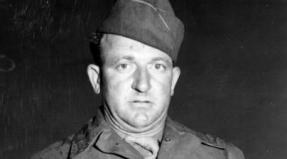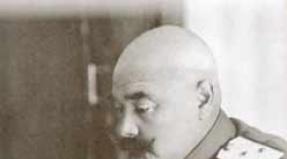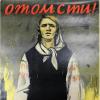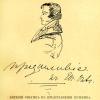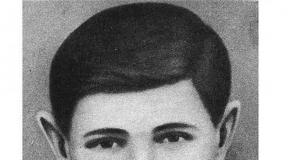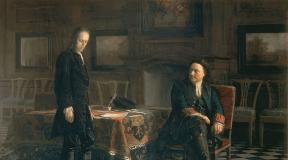When the collective farms began to issue passports. Literary and historical notes of a young technique
Dmitry Lyskov 24.04.2019 at 20:39
In 2008, a youth talk show was shown on TV Center TV Center on the topic "There is a future of communism." In the role of a specially invited historian, Dr. Historical Sciences made a member of the Memorial Human Rights Society Irina Shcherbakova, a researcher, according to her, the Soviet period. The Memorial Society itself has long and fruitfully engaged in writing the history of repression in the USSR, using his own, not fully understandable to a simple person and a very controversial method that appears on the ideological specification.
As a separate "slaughter" argument, proving the inhuman essence of the Soviet project, the researcher told about the fate of the peasants - even the passport of collective farmers in the USSR was issued only in 1974. The doctor called on to think over this blatant fact - before that, they say, the work of the peasants was used almost as slave on plantations.
The statement made a certain effect. Many in the studio about this, it turns out, did not even know (for youngsters, they did not read the perestroika "light") and sincerely horrified: how so?! At the same time, at the same time, did not occur to ask the historian, what exactly did the peasants suffered without a passport? Live, for example, people in the USA without passports, and nothing. What were the Soviet citizens deprived of "crusts"?
The doctor herself for some reason for some reason forgotten, and no one reminded in the studio, and it would be worth it, because it should be taken for the problem, it is worth considering it comprehensively, and not to create an ideological bee from it. Now, of course, it is difficult to imagine life without a passport, checking documents on the street (by the way, the child of democracy, unthinkable in the USSR), air tickets, clinic and much more - all tied to the main document of the citizen.
But they did not always exist passports. So the attitude towards them, and the need for their use at different times were different. It is absurd to indignant, for example, in the absence of the rural population of Russia, the beginning of the 20th century of international passports - the whole generations of our ancestors spent their entire life in one village, behind the Occolic, in the nearest grove, the world began with a capital letter, and the trip to the fair in the county center was an Ecumenical event, To him was preparing for months.
Actually, we have no usual passport system today until the 20th century did not exist at all. From the XV century in Germany, and then in other European countries, the passport appeared in the form of a "road letter" and served the purpose of separating wealthy travelers from the vagrants and robbers. There were "plague passports" (for residents of rough territories, in order to prevent the dissemination of the disease), "military passports" (for catching deserters).
In the troubled time, "Road Merry" appeared in Russia, and under Peter I "passage of the diplomas" became mandatory for travelers - it was connected with the introduction of the recruitment of duty and pillow. Later, the passport began to be used as a kind of "tax declaration", the payment of filters or taxes was noted in it with special marks. At the place of residence, the passport was not needed, it was necessary to receive it only when leaving 50 versts from home and for a period of more than 6 months.
It is only necessary to add that only men received passports, women fit into the passport of the spouse. An entry in the Russian passport of the 1912 sample looked like this: "With it, Efrosin's wife, 20 years old."
Thus, we see that until 1917, passports and in Russia, and in Europe were not at all a massive document, their role was gradually changed, but still coincided mainly to the "road certificate", that is, a document certifying the disgrace and human law. who left the place of residence.
You can look at this problem on the other hand, so, liberal researchers assess the role of a passport as a tool of the "police state", introducing control over the citizen, restricting the freedom of its movement. The passport system puts a person dependence on the official who passport gives out that it does not exclude the official arbitrariness regarding a particular individual. In this sense, the ideal is considered to be the United States, where the internal passport system has never existed.
"France became a single passport system for the entire population of the country. This happened during the Great French Revolution of 1789-1799. With the introduction and strengthening of this system, the concept of" police state "has arisen, which tightly controls citizens", "writes in a methodological manual" The right to life, freedom, property. Teacher's conversations with students of 8 classes "The team of authors of the liberal project" School - Legal Space ".
From this point of view, it is not clear at all, in which the crime of the communists who left the peasants without passports to the second half of the 20th century. And should not be, on the contrary, consider the crime issuing passports in 1974. However, we will not get ahead, we will deal with the passport problem of Irina Shcherbakova to the end.
Let's find out how the situation in which a significant part of the USSR population was without passports. It would seem that the Soviet regime should have immediately rolled its citizens in the French scenario - after all, about Red Terror, total control, the Bolsheviks who came to power on the bayonets were written by Tom and the hundreds of hours of television shows were shot.
However, no matter how surprisingly, the Bolsheviks did not restore the passport system of the Tsarist Russia and did not create their own. During the first 15 years of Soviet power in the RSFSR, and then in the USSR there was no single passport at all. The recovery of the passport system begins only in 1932, when the CEC and SCA of the USSR adopted a resolution "On the establishment of a single passport system for the SSR Union and the obligatory registration of passports."
The ruling indicates the reasons for passporting: " Install the Unified Passport System on the SSR Union on the basis of the Passport Regulations" - "In order to better take into account the population of cities, workers' settlements and new buildings and unloading these settlements from persons unrelated to production and work in institutions or schools and not employed by socially useful labor (with the exception of persons with disabilities and pensioners), as well as in order to clean these populated areas places from shelting kulats, criminal and other antisocial elements ".
The document indicates the order of passport - " having covered in the first place of the population of Moscow, Leningrad, Kharkov, Kiev, Odessa ... [Read the list of cities]"And the order" governments of the Union republics lead their legislation in line with this Resolution and Passport Regulations ".
If you read into the document it becomes clear that passports were introduced primarily to accounting for the population of cities and workers' settlements, as well as to combat crime. The introduction of passports on the village did not provide for the document at all (however, did not detect). At the same time, it is unlikely that anyone will challenge the indispensable situation of the city and the village in terms of the level of the cryminiogenic situation - indicators are clearly not in urban benefits. The village in the USSR, he was harsling with one district policeman from the locals.
Passportization, both for the purpose of accounting for the population and in order to combat crime, introduced the concept of "registration at the place of residence". A similar tool for control - with cosmetic changes - saved in Russia to this day under the name "Registration". He still causes many disputes, but his effectiveness in the fight against crime has little doubt.
Registration (or registration) is a tool for preventing uncontrolled population migration, in this regard, the Soviet passport code is a direct descendant of pre-revolutionary and as a whole, the European passport system, nothing new, as we see, the Bolsheviks have not invented.
Actually, the Naive Requirements of Academician Sakharov to allow free immigration from Afghanistan in the USSR for the sake of democracy for the Celebration of Democracy, in the 80s, they could also encourage individual segments of the population. Now to people who have lost the "democracy" in the 90s, no longer needed to clarify the meaning and purpose of restrictive measures from the Soviet authorities.
However, it is for the lack of freedom of movement that supporters of the "offend collective farmers" of the USSR period are still referred to. "But this is what's interesting," the authors already quoted the tutorials "Conversations of the teacher with students of 8 classes" write above - passports were injected only for residents of cities, workers' settlements and state farms. The peasants who began to be called collective farmers were even deprived of the right to have a passport. And having it, they were chained to their village, to their collective farm, they could not free to go to the city, as it was impossible to live without registration. "
Until the final absurdity brings the situation about the collective farm from Wikipedia - Free Encyclopedia ":" When introduced into the USSR, 1932 the passport system collective farmers did not issue passports so that they could not move to the city. To break out from the village, the collective farmers went to higher educational institutions, made a military career".
You think about what a simple peasant with the totalitarian Soviet regime brought: forced to enter universities and make a military career! How did they go to universities without a passport?
It turns out that elementary. Those who wish to study at the professor, enter the institute, "make a military career", work on newly created enterprises, etc. Passports were still issued. There was a certain problem to "simply move to the city" - for two reasons, and both depended not from the presence of a passport, but from the presence of a registration institution. The state considered its duty to provide every person with housing and workplace. The workplace, in addition, demanded a certain qualifications (and here the wishing could increase its qualifications in the school or university, there were no restrictions).
Where without work and housing is "just who arrived", having qualifications and education? Actually, we are watching it hourly on the streets of Moscow - with Tajiks living in garbage chunks, numerous homeless and beggars who agree to any, including criminal, work. Yes, there is free economic migration, and everyone can sell a house in the village, try happiness in the capital - for example, to replenish the number of beggars at the Kursk station.
Perhaps the Soviet system will seem not humane, deprived of freedom and too torganized. But we have an alternative to our eyes, we have the opportunity to compare. Which system is humane - giving guaranteed housing and employment, or an ephemeral "dream of success" - everyone decides for himself.
To the material " In Moscow, began to issue a new generation passport "
The first identity cards appeared in Russia in the XVIII century. In 1721, Peter I introduced compulsory passports for peasants, temporarily leaving the limits of permanent residence. At the beginning of the XIX century, passports appeared. By the end of the XIX century, the passport acquired an appearance close to the modern (book), indicating the origin, thesis, religion and with a marking of registration. In 1918, the passport system was eliminated. Any officially issued document was recognized as a certificate of personality - from the help of a volisten team to the trade union ticket. On December 27, 1932, the decision of the CEC and SCA of the USSR Passports was returned to the cities, towns of urban type, district centers, as well as in the Moscow region and a number of areas of the Leningrad Region. Passports were not issued to military personnel, disabled and residents of rural areas. In passports contained information about the date of birth, nationality, social status, the attitude to military service, a marital status, registration / in the 1960s N.S. Khrushchev gave a passport to peasants. On August 28, 1974, the Council of the USSR approved the Passport System Regulations: the passport was indefinite. Passportization has spread to the entire population of the country, except for military personnel. Passport columns remained the same, with the exception of social status.
On March 13, 1997, the Decree of the President of the Russian Federation Boris Yeltsin was published "On the main document certifying the identity of a citizen of the Russian Federation in the Russian Federation". Regulations on a passport of a citizen of the Russian Federation, a sample of a form and a description of the passport of a citizen of Russia approved by the Decree of the Government of the Russian Federation of July 8, 1997 No. 828. In accordance with the decision, in a new document, four pages are less than in the passports of the old sample, there is no "nationality" column. The concept of "Personal Code" has been introduced. Saved registration at the place of residence, attitude to military duty, marital status. On the cover of a new Russian passport, an embossed state coat of arms of Russia is depicted on its inner side - the Moscow Kremlin. Clause 2 Regulations on the passport of a citizen of the Russian Federation is presented as follows: Passport forms are made according to the Sample Unified Russian Federation and are issued in Russian. The passport forms, intended for registration in the republics in the Russian Federation, can be manufactured by liners having an image of the state emblem of the republic and providing for a citizen's personality information in the state language of this language. The phased replacement of the passport of the USSR citizen on the passport of a citizen of the Russian Federation began on October 1, 1997.
On February 21, 2006, a meeting of the Expert Advisory Council was held in Moscow at the Ministry of Internal Affairs of Russia at the Interdepartmental Working Group on the preparation of the introduction of new generation passport and visa documents in Russia. As you know, the introduction of Hi-Tech passports is interested not only by the Government of Western countries, but also Russia. Biometric passports in the next 2-3 years should be the usual phenomenon around the world. Such documents are equipped with a memory module containing fingerprints, a picture of the eye iris or other information about the owner. In May 2006, the Federal Migration Service began issuing biometric passports to Russians. The passport of the new generation contains a plastic liner with a microcham containing a two-dimensional photo of a citizen and text with its data. Wide distribution in Russia, such passports will receive in 2007.
The passport system was introduced on the territory of the USSR 27 more. 12. 1932 its main goal is to account the population of cities, workers' settlements, as well as the fight against the criminal element. Passports were issued only to people living in large and small cities.
And only on October 21, 1953, the Council of Ministers of the USSR approved the situation "On Passports", which indicated the terrain where citizens had to have a passport. They could have citizens of district centers, cities, urban-type settlements, as well as employees and workers who lived not in the village, including employees of state farms. The peasants of the same passports did not have, and in the period from 1935 to 1974 they were not allowed to leave their collective farm, to leave for another terrain.
According to various data, the number of peasants of different ages for 1970 was about 50 million people (and this is about 20.5% of the country's total population). They were not allowed to leave their village more than 30 days, and at the same time, it was necessary to take the appropriate permission to be taken to the native) in the village council.
According to historians, the state came with his population so that the peasants could not move freely in the country, change the place of residence. What is not slavery, only in a more modern form? In contrast to this opinion, historians say that this fact is not confirmed, because in fact, several millions of peasants were able to settle in cities. Talking that the Bolsheviks tried to attach the peasants to the ground - unreasonable, as the peasants found loopholes in legislation and were shut-off in cities.
Passport residents of the countryside were obtained only in 1974. Universal certification was carried out until 1989. The issuance of passports, discharge and registration was exclusively involved in police passports.
But even after issuing passports, the mode of registration was saved. Even those who changed the place of residence temporarily (more than 3 days) were subject to registration. To break out from the village, the collective farmer was supposed to enter the highest educational institution, or to do military career. At the invalid citizens, a fine was established and removal by the defendant of the city, the order of the police.
If the violation was committed again, it entailed criminal liability (according to the innovation of July 1, 1934 in the Criminal Procedure of the RSFSR of 1926, Art. 192a, imprisoned for up to 2 years).
Passports were also not in people leading an immoral lifestyle: in class enemies; people without registration; criminals, after serving the sentence; People who do not have a permanent place of residence. Maybe precisely for this reason in the cities, and the villages were calm, and there was no such rampant crime as now.
There was also an concept of temporary registration (while permanent residence was preserved). In any case, the passport was necessary to go to registration during the day, and register in the city, no later than 3 days from the day of arrival, for the countryside - no later than 7 days. Permanent registration could be obtained only if there is a stamp on an extract from the previous place of residence.
In 1974, rural residents of the USSR, finally, decided to issue passports, forbidding, however, to take them in cities to work. Observer "Power" Yevgeny Zhirnov restored the history of the struggle of the Soviet leadership for the preservation of a century of previously serfdom.
"There was a need for more accurate (passport) accounting of citizens"
When the Soviet schoolchildren learned the poems about the "red passport", many of them lines of Mayakovsky reminded that their parents could not get the "duplicate cargo duplicate", since he did not relieve the village residents to the village residents. And also that going to go from the native village somewhere further by the district center, every collective farmer was obliged to acquire his identity certifying help from the village council acting no more than thirty days .
We thank the legal company RUBICON CONSALTING engaged, registration of TOV in Kiev, for helping to publish materials on our website.
And that they gave it solely with the permission of the chairman of the collective farm, so that the peasant's life-recorded in his ranks did not undertake to leave a collective farm at his own request.
Click on the photo to enlarge:


Some villagers, especially those who had numerous urban relatives, were ashamed of their flawed position. And others about the injustice of Soviet laws did not even think about them, because he had never left their native villages in their entire life and the fields surrounded. However, as many generations of their ancestors. After all, it was such a attachment to his native foci that Peter I was achieving, when the three centuries ago, unknown passports were in use. The tsar reformer with their help tried to create a full-fledged tax and recruit system, as well as eradicate holidays for Russia. However, it was not so much about the magnificent accounting of the subjects of the empire, how much about the total restriction of freedom of movement. Even with the permission of its own Barin, having a written permission from him, the peasants could not drive away from their native village more than thirty miles. And for more distant travel, it was necessary to strain the passport on the letterhead, for which from Catherine times it was also required to pay considerable money.
Later freedom of movement lost both representatives of other estates of Russian society, including the nobles. But nevertheless, the main restrictions concerned the peasants. Even after the abolition of serfdom, without the consent of a rural society, confirming that there is no arrears for providing the passport, nor debts on obligations, it was impossible to receive a passport. And for all classes, there was a registration of passports and residence permits in the police, similar to the familiar to all of modern registration. Passports, however, quite easily formed, and from their registration in many cases almost legally died. But nevertheless consideration of the townships greatly facilitated control over them and all the rapid work of the police.
So there was nothing surprising in the fact that, with a new, revolutionary authority, the police decided to simplify life through the total accounting of citizens. After all, after the end of the Civil War and the introduction of a new economic policy, not only the revival of private business and trade, but also the mass movement of citizens seeking better share. However, market relations implied the availability of the labor market with freely moving labor. Therefore, the proposal of the NKVD in the Council of Sovnarkom met without special enthusiasm. In January 1923 people's Commissar of the Interior Alexander Beloborodov Complained to the Central Committee of the RCP (b):
"From the beginning of 1922 before N.K.V.D. The question arose about the need to change the existing order of residence permits. Decree of the WTCIK and SNK from 28 / VI-19 Detected only introduction of labor books in the cities of Petrograd and Moscow, and in other parts of the republic, no documents were introduced by this decree and only indirectly indicated (Art. 3 of this decree) to the existence of a passport, upon presentation of which the labor was issued. With the introduction of N.E.P. Ensured the meaning of the issuance of labor in Moscow and Petrograd and at the same time, due to the establishment of private trade and private production, there was a need for more accurate accounting of the urban population, and therefore the need to introduce the order in which the accounting could be fully secured.
Moreover, practice of decentralized issuance of documents On the ground showed that these documents were issued extremely diverse and essentially, and in form, and the certificates issued are so simple that the fake does not have any difficulty that, in turn, it extremely hampered by the work of the search bodies and militia. Considering all the above, the NKVD developed a draft provision, which, after coordination with interested departments, on February 23, 22, was submitted to SNK for approval. In a small Council in a meeting of May 26, 22, the introduction of a single residence permit in the RSFSR inexpedient is recognized. "
After a long time on instances, the issue of passports got to the highest legislative body - the Presidium of the WTCIK, but it was rejected there. But Beloborov insisted:
"The need for an established document - identity card is so great that on the ground has already begun to solve the issue in their own way. Projects developed Petrograd, Moscow, Turk republic, Ukraine, Karelian commune, Crimean Republic and a number of provinces. Assumption of various types of identity cards For individual provinces, areas extremely difficult to work administrative bodies and create many inconveniences for the population. "
The Central Committee also did not immediately come to a common opinion. But in the end, they decided that control is more important than market principles, and from January 1 banned the pre-revolutionary documents, as well as any other papers used to confirm the individual, including employment records. Instead, a single certificate of the personality of the USSR was introduced.
"The number of detainees was very significant."
However, in fact, the passportization of that was not carried out and everything was brought to the certificates of the established sample from the house administrations, with which it was not possible to establish real control over the movements of citizens. The Politburo Commission, in 1932, considered the question of passporting the country, stated:
"Order established decree of the Central Executive Committee of 20.VI.1923Modified decree from 18.VII.1927It was so imperfect that at this time the following situation was created. An identity card is not necessary, with the exception of the "cases provided for by law", but such cases in the law itself are not specified. An identity card is every document until the certificates issued by the house management. The same documents are enough for registration, and to obtain a food card, which gives the most favorable soil for abuse, since the house management on the basis of them of the issued documents themselves produce registration and give cards. Finally, decree of the ICTC and Sovnarkom from 10.xi.1930 The years the right to issue identity IDs was granted to the village councils and canceled a mandatory publication about the loss of documents. This law actually annulled the documentation of the population in the USSR. "
The question of passports arose in 1932 not by chance. After a solid collectivization of agriculture, a mass escape of peasants began in the city, which aggravated the growing year from year to year. And it is for the cleaning of cities, first of all of Moscow and Leningrad, a new passport system was intended for this supplied element. A single document certifying the identity was introduced in cities declared by the regime, and the certification served simultaneously by the method of their purification from the runaway peasants. Passports, however, did not give out not only to them, but also the enemies of the Soviet power, devoid of election rights, repeatedly convicted criminals, as well as all suspicious and socially alien elements. Failure to issue a passport meant an automatic eviction from the regime city, and for the first four months of 1933when the two capitals could pass in Moscow, the population decrease was 214,700 people, and in Leningrad - 476 182.
During the campaign, there were numerous errors and beggars. Thus, the Politburo indicated the police that old people whose children received passports, they should also be issued, even despite belonging to the revolution to the property and ruling classes. And to maintain antireligious work, allowed to pass the former priests voluntarily refused by Sana.
In the three largest cities of the country, including the then Capital of Ukraine Kharkov, after passporting, not only the criminal situation improved, but also less consumers.
In the three largest cities of the country, including the then Capital of Ukraine Kharkov, after passporting, not only the criminal situation improved, but also less consumers. And the supply of the passported population is not too substantial, but improved. What could not pay the heads of the heads of other major cities of the country, as well as the surrounding areas and regions. Following Moscow passportization spent in the hostess area around the capital. And already in February 1933, in the list of citieswhere the priority certification was carried out, turned on, for example, under construction Magnitogorsk.
As the list of regime cities and localities expands, the population has grown and countering the population. Citizens of the USSR, who remained without passports, have acquired lipov certificates, changed biographies and surnames and moved to the places where the passportization only had to be attended and it was possible to try his happiness again. And many came to regime cities, lived there illegally and mined their meal, working at home on orders of various artels. So even after the end of the certification, the cleaning of regime cities did not stop. In 1935, the head of the NKVD Heinrich Yagoda and the Prosecutor of the USSR, Andrei Vyshinsky, reported to the Central Committee and Council on the creation of extrajudicial "triples" for violators of the passport regime:
"In order to quickly clean cities under the action of Art. 10 of the Passport Act, from criminal and declared elements, as well as malicious violators of the provisions on passports, drug addict and the prosecutor's office of the USSR Union on January 10, 1935. Dalited an order to form education on places of special triple for The work permits of the specified category. This event was dictated by the fact that the number of detained persons on the specified cases was very significant, and consideration of these cases in Moscow in a special meeting led to an excessive tightening of these cases and overloading places of preliminary conclusion. "
At the document, Stalin wrote a resolution: "" Fast "cleaning is dangerous. It is necessary to purify gradually and thoroughly, without jolts and unnecessary administrative delight. It would be necessary to determine the one-year ending deadline." By 1937, the comprehensive cleaning of cities in the NKVD was completed and reported in accordance with the Council:
"1. In the USSR, passports were issued to the population to the population of cities, workers' settlements, district centers, new buildings, MTS location sites, as well as all settlements within 100-kilometer strip around Moscow. Moscow, Leningrad, 50-kilometer strip around Kiev and Kharkov; 100 -Kilometer Western European, Eastern (Vost. Siberia) and the Fal-Eastern Border Stripe; Esplantic DVK Zone and Sakhalin Islands and Workers and Employees (with Families) of Water and Railway Transport.
2. In the remaining rural non-passported panels of the passport, only the population goes to waste, to study, for treatment and for other reasons. "
Actually, this was the second in order, but the main intended purpose of passporting. The rural population remaining without documents could not leave their native places, since the violators of the passport regime were expected to "Troika" and imprisonment. And getting a certificate of departure to work in the city without the consent of the board of the collective farm was absolutely impossible. So, the peasants, as in the times of serfdom, were tightly tied to their native foci and had to fill the origin of the birthplace for the pitiful grain issuing to work or at all for free, since they were simply left for any choice.
Passports were given only to peasants in border prohibited zones (in the number of these peasants in 1937, collective farmers were included in the Transcaucasian and Central Asian republics), as well as residents of rural areas attached to the USSR Latvia, Lithuania and Estonia.
"This order is not justified by anything"
In subsequent years, the passport system has only tightened. Restrictions on accommodation in regime cities for all non-educated elements, with the exception of retirees, disabled people and dependents of workers, which actually meant automatic deprivation of registration and eviction from the city of any person who has lost its work and has no working close ones. Appeared I. practice consolidation on hard work by removing passports. For example, since 1940, miners in personnel departments have been withmolding passports, Having issuing special certificates instead, the owners of which could neither settle down on a new job, nor leave the accommodation defined by him.
Naturally, the people were looking for loopholes in the laws and tried to break free. Main way to leave the native collective farm has become a recruitment to even more hard work - logging, the development of peat, construction in remote northern regions. If the discharge of the workshop was descended from above, the Chairmen of the collective farms could only pull the flolycy and delay the issuance of permits. True, the passport was discussed only for the term of the contract, a maximum of the year. After that, the former collective farmer was trying to extend the contract with all the truth and untrue, and then go to the category of permanent workers of his new enterprise.
Another effective way to receive a passport has become early sending children to studies to factory-starting schools and technical schools. The collective farm voluntarily was written to all living on its territory, starting from sixteen years. And the focus was that the teenager came to study at 14-15 years old, and already there, in the city, received a passport.
but the most reliable means of deliverance from the collective farm cable for many years remained service in the army. Having giving birth to patriotic debt, rural guys crowded to the factories, construction, in the police, remained at the superior service, just not to return home, in the collective farm. Moreover, their parents supported them in every way.
It would seem that the end of the collective farm yoke had to step after the death of Stalin and come to the power of a loving and understanding the peasantry Khrushchev. But "Dear Nikita Sergeevich" did not make anything to change the passport regime on the village of an even account, apparently, realizing that, having received freedom of movement, the peasants stop working for pennies. Nothing changed and after the shift of Khrushchev and the transition of power to the triumvirata - Brezhnev, Kosygin and Podgorny. After all, the country still needed a lot of cheap bread, and to get it differently, as the exploitation of the peasants, have long already learned. That is why in 1967, the proposal of the First Deputy Chairman of the Sovmina of the USSR and the main responsible for agriculture Dmitry Polyansky The first persons of the country were encountered in the bayonets.
"According to the current legislation, Polyansky wrote," the issuance of passports in our country applies only to persons living in cities, district centers and towns of urban-type (aged 16 years and older). Those who live in rural areas are not eligible. To receive this main document certifying the identity of the Soviet citizen. Such an order is currently not acquitted by anything, especially since in the territory of the Latvian, Lithuanian and Estonian SSR, Moscow and Kaliningrad regions, some areas of the Kazakh SSR, the Leningrad Region, Krasnodar and Stavropol Terrays and In the border zone of the passport, they are issued to everyone living there, regardless of the citizens they or village residents. In addition, on the current practice of the passport are issued to citizens living in rural areas if they work in industrial enterprises, institutions and organizations or transport, and also materially responsible employees in collective farms and state farms. for data M of the Ministry of Public Procedure of the USSR, the number of persons living now in rural areas and have no rights to a passport reaches almost 58 million people (aged 16 years and older); This is 37 percent of all USSR citizens. The absence of passports in these citizens creates significant difficulties for them in the implementation of labor, family and property rights, admission to study, upon receipt of various kinds of postal shipments, the acquisition of goods on credit, registration in hotels, etc. ... one of the main arguments of the inexpediency of passport issues Citizens living in rural areas were the desire to restrain the mechanical growth of the urban population. However, the passportization of the entire population held in the above-mentioned allied republics and regions showed the unreasonableness of concerns that were expected to this; She did not cause an additional influx of the population from the village to the city. In addition, such an influx can be adjusted and in the presence of passports from rural residents. The current procedure for passporting, the infringement of the rights of Soviet citizens living in the village causes them legal discontent. They rightly believe that such an order means for a significant part of the population not reasonable discriminationwith which you need to end. "
When voting on the proposed Politburo, the most famous members - Brezhnev and Suslov - the project was not supported, and no less influential Kosygin proposed to discuss the issue additionally. And after the emergence of disagreements, according to the initial breech order, any problem was filmed from consideration for an indefinite time.
However, the question arose two years later, in 1969, and raised him minister of Internal Affairs of the USSR Nikolai Localkovwho collided, like his predecessor of Beloborodov, with the need to organize an accurate magnitude accounting of all citizens of the country. After all, if on each passported citizen of the country in the police, together with his data, photography was kept photograph, they did not seem to identify the crimes of the crimes of guests from the village. Locks, however, tried to submit the case as if it were about issuing new passports throughout the country, during which you can eliminate and injustice towards peasants.
"The publication of the new provision on the passport system in the USSR," said the Ministry of Internal Affairs to the Central Committee of the CPSU, is also caused by the need for a different approach to solving a number of issues related to the passport system, in connection with the adoption of new criminal and civil laws. In addition, this Time according to the existing position of the passport has only residents of urban areas, the rural population does not have them, which creates large difficulties for residents (upon receipt of postal items, acquiring goods on credit, leaving tourist tickets abroad, etc.). Comething The country changes, the growth of the welfare of the rural population and the strengthening of the economy base of collective farms prepared the conditions for issuing passports and the rural population, which will lead to the elimination of differences in the legal status of the USSR citizens in terms of documenting their passports. However, the current passports manufactured by samples approved yet in the thirties, morally outdated, their appearance and Quality causes fair complaints of workers. "
Aloks entered the nearest round of Brezhnev and could count on success. However, now the Podgorny, who voted for the Polyansky project, spoke sharply against: "This event is inexpressive and contrived." And the question with the passport of collective farmers is again hung in the air.
Only in 1973 the case moved from a dead point. Schelokov again sent a note to the Politburo on the need to change the passport system, which was supported by all the leaders of the KGB, the prosecutor's office and the authorities of the Justice. It could seem that the only time in the history of the USSR, Soviet law enforcement agencies defended the rights of Soviet citizens. But it only seemed. In response department of administrative bodies of the Central Committee of the CPSU, who supervised the army, KGB, the Ministry of Internal Affairs, the Prosecutor's Office and the judiciary, said:
"According to the Ministry of Internal Affairs of the USSR, there is a need to solve a number of questions in the country in a new way. In particular, it is proposed to guide not only urban, but all the rural population, which currently does not have passports. This applies 62.6 million countryside residents over the age of 16, which is 36 percent to the number of the entire population of this age. It is assumed that the passportization of rural residents will improve the organization of accounting of the population and will contribute to a more successful detection of antisocial elements. At the same time, it should be borne in mind that the implementation of this event may affect individual areas to the migration processes of the rural population in the city. "
The Politburo Commission made to prepare the passport reform, took into account the interests of all parties, worked slowly and prepared its proposals only in the following, 1974:
"It would be necessary to adopt a new provision on the passport system in the USSR, since the provision currently approved in 1953, which is now outdated, and some rules established by them require revision ... The project provides for passports throughout the population. This will create more favorable conditions for The exercise by citizens of their rights and will contribute to more complete accounting of the movement of the population. At the same time, for the collective farmers, the existing procedure for admission to work on enterprises and construction, i.e., if there are certificates of their holidays for collective farms. "
As a result, the collective farmers, except for the possibility of getting out of the Kronnok Passportin, did not receive. But in the same year in the Helsinki Meeting on Safety and Cooperation in Europe, where the question about human rights in the USSR was quite acute enough, no one could overcome Brezhnev that he had sixty million people deprived of freedom of movement. And the fact that they managed to work in the serfdom, as they continued to work for pennies, remained a secondary detail.
Evgeny Zhirnov
According to the decision of the Council of Ministers of the USSR of Passport, all selans began to be issued only in 1976-81.
http://www.pravoteka.ru/pst/749/374141.html
Resolution of the USSR of August 28, 1974 N 677
"On approval of the Regulations on the passport system in the USSR"
The Council of Ministers of the USSR decides:
1. To approve the attached position on the passport system in the USSR, a sample of a passport of a citizen of the Union of Soviet Socialist Republics *) and a description of the passport.
Enter the position of the passport system in the USSR, with the exception of paragraphs 1-3, 5, 9-18, concerning the issuance of passports of the new sample, from July 1, 1975 and in full - from January 1976
The instruction on the procedure for applying the provision on the passport system in the USSR is published by the Ministry of Internal Affairs of the USSR.
In the period from July 1, 1975 to January 1, 1976, it was issued to the issuance of passports of old-sample passports in accordance with the Regulations on Passports approved by the Resolution of the USSR Council of Ministers of October 21, 1953, taking into account the subsequent additions and changes.
To establish that before the exchange of citizens of passports of an old sample on the passport of the new sample, the passports previously issued to them are preserved. At the same time, the ten-year and five-year-old passports of the old sample, the term of which will expire after July 1, 1975, are considered valid without official extension of their action before the exchange of a new sample passport.
Citizens living in rural areas, which previously not issued passports, when traveling to another area, passports are issued for a long time, and when leaving for a period of up to one and a half months, as well as in the sanatorium, holiday homes, at the meeting, on a business trip or with temporary attraction of them on sowing, cleaning and other works are issued by the executive committees of rural, settlement councils of deputies of workers' certificates certifying their identity and goal of departure. The form of reference is established by the Ministry of Internal Affairs of the USSR.
3. The Ministry of Internal Affairs of the USSR to develop with the participation of interested ministries, departments of the USSR and the Councils of Ministers of the Federal Republics and to approve activities that ensure work on issuing passports of a new sample on time.
Councils of Ministers of Union and Autonomous Republics and Executive Commands of Local Councils of Workers' Deputies to assist in the internal affairs bodies in the organization and conduct of work related to the issuance of passports of a new sample, and take measures to improve the placement of passport service workers, as well as to create the necessary conditions for service population.
4. To oblige Ministries and departments of the USSR and the Councils of Ministers of the Union republics to take additional measures to fulfill the subordinate enterprises, organizations and agencies of the decision of the Central Committee of the CPSU and the Council of Ministers of the USSR on February 25, 1960 N 231 "On measures to eliminate stationery-bureaucratic perversions when making workers To work and resolve the household needs of citizens "and eliminate the existing cases of the requirements from citizens of various kinds of certificates when the necessary data can be confirmed by the presentation of a passport or other documents.
Chairman
Council of Ministers of the USSR
A.Koshipin
Business manager
Council of Ministers of the USSR
M.Smirtyukov
Position
about the passport system in the USSR
(approved by Decree of the USSR of August 28, 1974 N 677)
(With amendments of January 28, 1983, August 15, 1990)
I. General provisions
1. The passport of a citizen of the Union of Soviet Socialist Republics is the main document certifying the identity of the Soviet citizen.
The passport of the USSR citizen is obliged to have all the Soviet citizens who have reached the age of 16.
With no specified passports, Soviet citizens who arrived in the USSR who arrived for temporary residence permissive in the USSR are living, permanently residing abroad.
Documents certifying the identity of the servicemen are identity cards and military tickets issued by the command of military units and military institutions.
Documents certifying the identity of those who arrived for temporary residence in the USSR of Soviet citizens who permanently residing abroad are their civilian passports.
Foreign citizens and stateless persons live in the territory of the USSR on documents established by the legislation of the SSR Union.
See the text of the point in the previous edition
…
http://ussr.consultant.ru/doc1619.html
Resolution of the Sovmina of the USSR of 28.08.1974 N 677 "On Approval of the Regulations on the Passport System in the USSR"
Source of publication: "Code of Laws of the USSR", vol. 10, p. 315, 1990, "SP of the USSR", 1974, N 19, Art. 109.
Note to the document: ConsultantPlus: Note.
When applying the document, we recommend an additional check of its status, taking into account the current legislation of the Russian Federation
Title of the document: Resolution of the Sovmina of the USSR of 28.08.1974 N 677 "On Approval of the Regulations on the Passport System in the USSR"
Links
As promised yesterday, I create a new topic on the discussion of a fairly common myth that the collective farmers did not issue passports and that they were limited in moving around the country and therefore were almost fastened.
The myth is often used by supporters of liberals, as one of the proofs of the Soviet project.
So, proceed.
For the first time, passports appeared in the USSR in 1932, on the basis of two decisions of 27.12.32: "Decisions on the establishment of a single passport system" and "Passports".
I will give both to avoid curved
On the establishment of a single passport system for the SSR Union
And mandatory passport
In order to better take into account the population of cities, workers' settlements and new buildings and unloading these settlements from persons who are not related to production and work in institutions or schools and not engaged in socially useful labor (with the exception of people with disabilities and pensioners), as well as in order to clean these purposes Locguler from shelled Kulatsky, criminal and other antisocial elements, the Central Executive Committee and the Council of People's Commissar Union of the SSR are resolved:
1. Install the Unified Passport System on the basis of the Passport Regulations.
2. To introduce a single passport system with mandatory registration throughout the SSR alliance during 1933, covering the population of Moscow, Leningrad, Kharkov, Kiev, Odessa, Minsk, Rostov-on-Don and Vladivostok.
3. To entrust the Council of People's Commissars of the SSR Union to establish the timeline and order of introducing a passport system in all other localities of the SSR Union.
4. To entrust the governments of the Union republics to lead their legislation in line with this Decree and Regulations on Passports.
Chairman of the CEC Union SSR
M.Kalinin
Chairman of SNK Union SSR
V.Molotov (Scriabin)
Secretary CEC Union SSR
A.Enukidze "
Regulations on passports
1. All citizens of the SSR Union aged from 16 years, permanently residing in cities, workers working in transport, in the state farms and in new buildings, are required to have passports.
2. Locals where the passport system is introduced, the passport is the only document certifying the owner.
Nevertheless, other documents and certificates that served as a residence permit are canceled as invalid.
Passport is required for presentation:
a) when registering the owner of the passport (registration);
b) upon admission to work in the enterprise and the institution;
c) at the request of the militia and other administrative bodies.
3. Registration of persons in localities where the passport system is introduced is certainly obligatory.
Citizens, changing the place of their residence within the locations, where the passport system was introduced, or newly arriving in these settlements are obliged to present their passports through the house management for registration in the police no later than 24 hours upon arrival at a new residence.
4. Persons under the age of 16 are listed in the passport of persons on the dependency of which they consist.
Persons under the age of 16 years, which are dependent on the state (in orphanages, etc.) are recorded in the lists that are conducted by relevant institutions.
5. For military personnel, consisting on the actual military service in the RKKK series, the documents issued for them issued by the appropriate command are replaced by a passport.
6. Passports are issued by the working and peasant militia authorities. Citizens who permanently residing in the settlements, where the passport system has been introduced, passports are issued without submitting applications, and citizens arriving in these settlements from other locations - according to their statements.
7. Citizens permanently residing in areas where the passport system has been introduced, passports are issued for a three-year term.
In the future, before the introduction of the passport system throughout the SSR Union, allow the bodies of the working and peasant militia of cities in registration of newly arriving citizens to produce temporary certificates for a period of no more than three months.
8. When issuing passports from citizens, three rubles is charged, and when issuing temporary certificates is one ruble.
9. The passport is necessarily entered:
a) name, patronymic and surname;
b) time and place of birth;
c) nationality;
d) social status;
e) permanent residence;
e) place of work;
g) passing mandatory military service;
h) persons entered into the owner's passport;
and) a list of documents on the basis of which a passport is issued.
Note. The list of documents on the basis of which the passport is issued, is established by the instruction.
10. Passport books and forms are made according to the SSR for the whole Union. The text of passport books and forms for citizens of various union and autonomous republics is printed in two languages: in Russian and in language, commonly used in this union or autonomous republic.
11. Persons obliged to have passports and without passports or temporary certificates are administratively fined in the amount of up to one hundred rubles.
Citizens who arrived from other localities without a passport or temporary certificate and not chosen during the passport period established by the instructions or temporary certificate are subject to a fine of up to 100 rubles and disposal of the police authorities.
12. For accommodation without a passport or temporary certificate, as well as for violation of registration rules, the perpetrators are administered in an administrative procedure in the amount of up to 100 rubles, and when re-violating the rules of registration are subject to criminal liability.
13. Persons who are entrusted with the responsibility of registration (management, commandants, homeowners, apartment owners, etc.), are subject to responsibility established in Art. 12 of these Regulations.
14. Fake passport forms entails criminal liability as a fake of government securities under Art. 22 Regulations on the crimes of state (S.Z. Union of SSR, 1929, N 72, Art. 687).
15. Flag of passports and the use of a substrate or someone else's passport entails criminal liability in the legislation of the Union of SSR and the Union republics.
16. Instruct the Main Directorate of the Workers' and Peasant Militia under the OGPU of the SSR Union for a ten-day period to submit to the approval of the Council of People's Commissars of the SSR Union Instructions on the implementation of this Regulation.
Chairman of the CEC Union SSR
M.Kalinin
Chairman of SNK Union SSR
V.Molotov (Scriabin)
Secretary CEC Union SSR
A. Yenukidze

